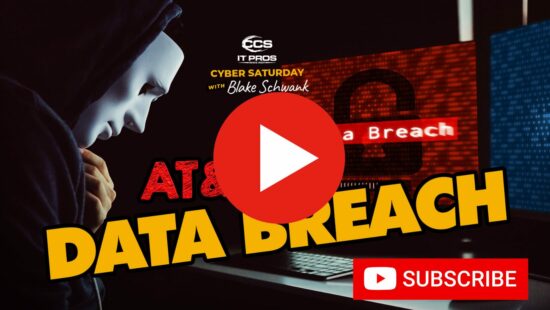Advance Auto Parts recently faced a significant data breach, exposing [...]
Credit Union Text Messages In Colorado Springs
Key Points:
- A financial institution texted you about suspicious activity on your account.
- There are many reasons some credit unions will not use this feature.
- Before you click that text’s link, do this before you get hooked!
- What can you do if there’s no way to opt out of smishing permanently?
It’s one thing when you receive a strange text message from an unknown number. But what if the message was from your financial institution claiming suspicious activity on your account, and they need you to respond? Should you click the link provided in the text or call them?
The reason for caution is that cybercriminals will go to great lengths to steal from you using smishing text messages to hook you. We recommend never letting your guard down. Even if you think the message is legitimate, call them. In this video, Blake shows you what he did first.

Hear From Our
Happy Clients
Read Our Reviews

Do Credit Unions Commonly Use Text Messaging?
Not all credit unions have adopted this technology. Some see the advantage; others do not. It may depend on their preferences, privacy concerns, compliance requirements, and other security protocols that protect their customers and the financial institute.
Those who use text messaging see the technology as a way to add convenience for their member—for instance, scheduling appointments by text, upcoming reminders, or follow-up messages after a visit, requesting feedback, or taking a short survey.
Some credit unions send out an automated text message to all members if one of their branch offices is permanently closing with further details. Others have used the technology to send offers and promotions about new features, products, or services.
If There’s A Link In The Text, Should I Click It?
The first step we recommend to all Colorado Springs organizations is to call the credit union first. If they confirm that they did send the text, then proceed. That immediately lets you know the text message is not from a scammer or cybercriminal.
If they did not, and you or one of your employees did click the link, there is a greater possibility a scammer sent that text message. Immediately stop and back out of the message. Next, block the number, and delete the message.
Unfortunately, more Colorado Springs businesses and organizations are getting smishing texts regularly. Sometimes the message is genuinely from their financial institution. However, the trend we’re seeing is ongoing fraudulent phishing scam text messages getting sent.
How Can I Stop Getting Smishing Text Messages?
Currently, there is no single solution that permanently opts you out of getting smishing text messages. When you receive one, block it, and delete the number, a day or two later, another is sent to your phone from a different number. It’s never-ending.
The options available are reporting the smishing text messages to your credit union, then the Federal Communications Commission, and finally the Federal Trade Commission. Another option is to inform the smishing text to your cellphone provider.
Next, go to the FCC website, https://reportfraud.ftc.gov/#/, to file your complaint about the smishing text message you received. After that report, head to the FTC website, https://consumercomplaints.fcc.gov/hc/en-us, and file a complaint with them too.
Let’s Recap!
You just received a text message from your credit union. They’re alerting you to suspicious activity on your account and want you to click a link to proceed. You’re not sure what to do. Your first step is to call your credit union to verify they sent you the message. Proceed if they did.
Should your credit union advise they did not send you a text message, then let them know what number the text came from and the message’s content. Next, notify the authorities and report the fraudulent message to them—finally, inform your cell phone provider of the number.
Credit unions typically don’t send unsolicited text messages to their customers needing them to click a link. Our steps will protect you from a potential smishing scam. For more information, Colorado Computer Support is always ready to help. Call us now at (719) 310-3035.
Latest Blog Posts

Discover why rural and critical access hospitals are not immune to [...]

Explore the recent AT&T data breach affecting call logs from Oct 2022 [...]



